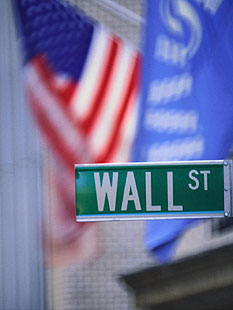Back in the dim past, investment banks were mostly in the business of providing advice and underwriting services to their clients. Oh, they traded a bit on the side with their own money too, but not a lot. That was sort of risky, after all. Better to focus on giving other people advice about what to buy and sell rather than doing it themselves.
But times changed, fixed commissions went away as a guaranteed source of easy income, and proprietary trading started to grow more important. And why not?  Since investment banks were also market makers, their prop desks had privileged access to streams of information that most investors could only dream of. Why not use that information instead of letting it go to waste?
Since investment banks were also market makers, their prop desks had privileged access to streams of information that most investors could only dream of. Why not use that information instead of letting it go to waste?
So use it they did. In fact, they used it so voraciously that eventually trading became by far their biggest profit centers. Basically, investment banks became gigantic hedge funds with a bit of investment banking tacked on to the side. And that’s not all. By the year 2000, two more things had happened. First, the Glass-Steagall Act was repealed in 1999, which allowed investment banks to merge with commercial banks. Second, investment banks had all become public companies, which meant they not only had enormous amounts of capital to invest, but none of their traditionally risk-averse partners were personally liable if they lost it all.
I think you know how this all turned out. Long story short, they lost it all. What’s more, their losses would have taken down the entire banking system if they hadn’t been rescued via massive government intervention. Along the way, the last of the investment banks technically disappeared, when Morgan Stanley and Goldman Sachs got Fed permission to convert themselves into ordinary bank holding companies.
Given all this, you might wonder if it was such a good idea to let banks engage in proprietary trading in the first place. Instead, why not limit them to taking deposits, making loans, underwriting stock and bond offerings, giving M&A advice, and so forth? That’s what banks do, after all.
Well, it turns out that Paul Volcker is wondering the same thing:
“Extensive participation in the impersonal, transaction-oriented capital market does not seem to me an intrinsic part of commercial banking,” he said in a speech to the Association for Corporate Growth in Los Angeles.
….Mr. Volcker said banks should be banned from “sponsoring and capitalizing” hedge funds and private-equity firms, and said “particularly strict supervision, with strong capital and collateral requirements, should be directed toward limiting proprietary securities and derivatives trading.”
He also said collateral and leverage restrictions against the largest non-banking institutions “may be needed.”
I like the way this Volcker fellow thinks. Let banks do banking, protected by federal guarantees, while securities trading is firewalled safely away from the plumbing of the financial system. And even at that, if your hedge fund or private-equity firm is big enough that it might destroy the world too — think LTCM — it gets regulated as well.
Anybody got a problem with that?

















